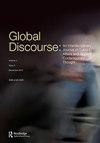印以关系:纳伦德拉·莫迪治下的变化
IF 1.4
Q2 INTERNATIONAL RELATIONS
引用次数: 1
摘要
2014年5月,纳伦德拉·莫迪(Narendra Modi)成为印度总理时,印以关系虽然有些停滞,但稳定、进步和扩大。尽管军事安全关系是两国关系的主要组成部分,但积极的政治干预似乎是必要的,因为左翼政党不断要求曼莫汉•辛格(Manmohan Singh)领导的联合进步联盟(United Progressive Alliance)政府对以色列进行“路线修正”。虽然国大党领导的政府顶住了压力,但与以色列的关系仍处于紧张状态,由于和平进程停滞不前,进展甚微。在这种情况下,莫迪成为总理,并在印度外交政策矩阵中优先考虑以色列方面迎来了巨大的变化。这一转变也受到一系列国内外因素的推动。本文章由计算机程序翻译,如有差异,请以英文原文为准。
Indo-Israeli relations: changes under Narendra Modi
When Narendra Modi became prime minister in May 2014, Indo-Israeli relations were stable, progressing and expanding, though somewhat stagnant. Although military–security ties were a major component, active political intervention seemed necessary, as parties of the Left constantly demanded a ‘course correction’ vis-a-vis Israel from the decade-long United Progressive Alliance government under Manmohan Singh. While the Congress-led government withstood the pressure, relations with Israel were under stress, with little progress or visibility due to the stalled peace process. Under those circumstances, Modi became prime minister and ushered in dramatic changes in prioritising Israel in India’s foreign policy matrix. This shift was also helped by a host of domestic and external factors.
求助全文
通过发布文献求助,成功后即可免费获取论文全文。
去求助
来源期刊

Global Discourse
Social Sciences-Political Science and International Relations
CiteScore
4.10
自引率
6.70%
发文量
64
期刊介绍:
Global Discourse is an interdisciplinary, problem-oriented journal of applied contemporary thought operating at the intersection of politics, international relations, sociology and social policy. The journal’s scope is broad, encouraging interrogation of current affairs with regard to core questions of distributive justice, wellbeing, cultural diversity, autonomy, sovereignty, security and recognition. All issues are themed and aimed at addressing pressing issues as they emerge.
 求助内容:
求助内容: 应助结果提醒方式:
应助结果提醒方式:


